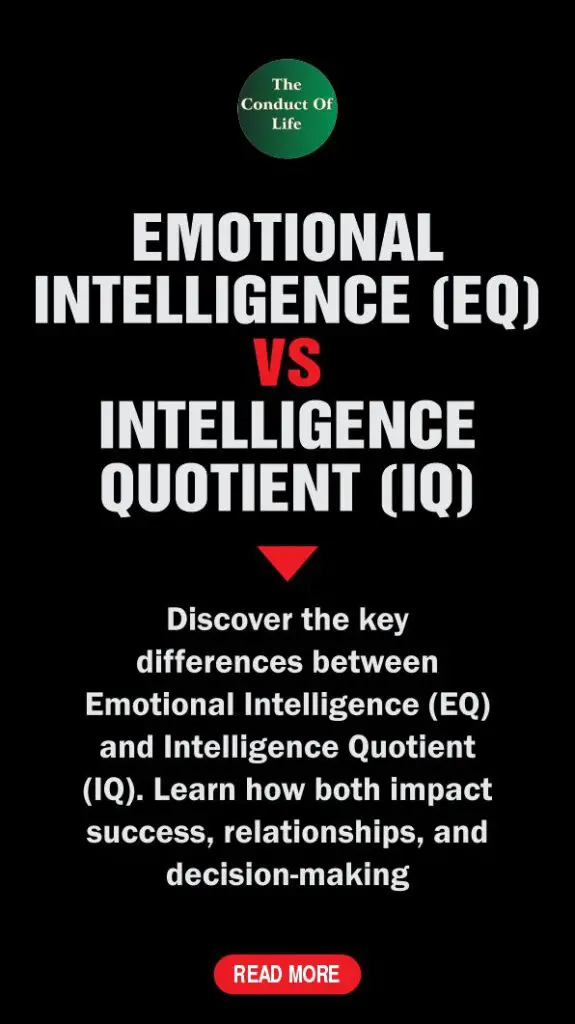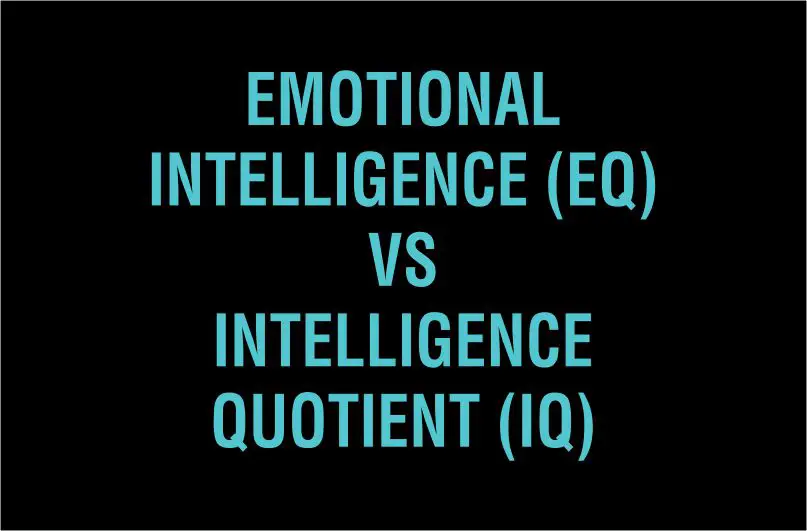Last updated on June 10th, 2025 at 01:55 pm
In a world where success is often measured by intelligence and performance, there’s a growing recognition that it’s not just IQ that determines how well we navigate life.
Emotional intelligence (EQ) is emerging as a powerful factor in shaping how we connect with others, handle stress, and make decisions.
While IQ tends to focus on cognitive abilities, EQ plays a vital role in our interactions, resilience, and overall well-being.
Understanding the dynamic between EQ and IQ can reshape how we approach challenges, relationships, and personal growth.
In this article, we’ll look at the raging debate between both and how they can be harnessed for optimum living.
Recommended: What Causes Low Emotional Intelligence?

Table of Contents
- The Debate: EQ vs. IQ
- Overview of Emotional Intelligence (EQ)
- Differences Between EQ and IQ
- Measuring IQ and EQ
- The Impact of EQ vs. IQ
- Why EQ Matters More Than IQ in Some Areas
- How EQ Can Complement IQ
- Developing Both EQ and IQ
- Frequently Asked Questions
- Conclusion
The Debate: EQ vs. IQ
The distinction between Emotional Intelligence (EQ) and Intelligence Quotient (IQ) has become more relevant as we recognize the role both play in shaping personal and professional success.
Historically, IQ has been the measure of cognitive ability, often linked with academic performance and intellectual achievements.
However, EQ, which deals with the understanding and management of emotions, both yours and others, has gained increasing attention in discussions about what truly contributes to success.
This shift towards recognizing emotional intelligence highlights how essential managing emotions is, not only for personal relationships but also for thriving in professional environments.
While a high IQ might help you excel in academic or analytical tasks, a high EQ will often dictate how well you connect with people and lead teams.
IQ: What Is It?
IQ measures cognitive abilities like memory, logical reasoning, and problem-solving.
Developed over a century ago, it has since become one of the most recognized measures of intelligence.
IQ tests assess how well you can use reasoning to tackle problems, retain information, and make decisions.
These skills are critical for navigating complex situations, whether in school or at work.
While a high IQ correlates with academic success, it does not guarantee interpersonal success.
People with high IQs may excel in environments requiring analytical thinking, but struggle when it comes to reading social cues, managing stress, or communicating effectively.
Key Components of IQ
- Problem-solving: Ability to tackle complex challenges with logical approaches.
- Memory: Retaining and recalling information, is critical for academic and professional success.
- Analytical Thinking: The capacity to break down and understand complex concepts.
- Logical Reasoning: Processing information and arriving at well-informed decisions.
Related: What Are Emotions and How Do They Influence You?
Overview of Emotional Intelligence (EQ)
EQ refers to your ability to identify, understand, and manage your emotions, as well as recognize and influence the emotions of others.
Unlike IQ, which focuses purely on intellectual abilities, EQ emphasizes emotional skills, including empathy, self-regulation, and interpersonal communication.
A person with high EQ will likely be more adaptable in social situations and can navigate stress and conflict with greater ease.
This makes EQ invaluable not just for managing personal emotions, but also for effectively interacting with others in various settings, such as at work or in relationships.
Key Components of EQ
- Emotional Awareness: Recognizing your emotions and understanding how they influence your behavior.
- Empathy: The ability to understand and share the feelings of others, an essential skill for building meaningful relationships.
- Social Skills: The ability to interact harmoniously with others, decode verbal and non-verbal cues, resolve conflicts, and create strong social bonds.
- Self-regulation: Managing your emotions in healthy ways, particularly in stressful or challenging situations.
Differences Between EQ and IQ
At a basic level, the distinction between IQ and EQ is straightforward. IQ measures cognitive abilities, how well you think, reason, and solve problems.
It’s largely influenced by genetics and education. Meanwhile, EQ focuses on emotional and social competencies, like empathy and managing relationships, which are not fixed but can improve over time.
While a person with a high IQ may excel in analytical tasks, someone with a high EQ will likely shine in leadership roles or social settings.
Their ability to manage emotions, understand others, and foster trust makes them better equipped for teamwork and conflict resolution.
Measuring IQ and EQ

IQ is typically evaluated using standardized tests, where your results are compared to a general population.
These tests give you a numeric score that reflects your cognitive abilities. In contrast, EQ is measured in more subjective ways.
Self-assessments, peer feedback, and situational judgment tests can help gauge emotional intelligence.
These methods assess how well you interact with others and manage your emotions in different scenarios.
The Impact of EQ vs. IQ
Both IQ and EQ significantly influence your success, but they impact different aspects of your life.
Academic Success
A person with a high IQ will likely do well in traditional educational settings.
Their ability to reason, remember information, and solve problems efficiently makes them excel in tests and complex coursework.
However, emotional intelligence plays a role in other areas, like group projects.
People with high EQ tend to work better in teams, understanding the emotions and needs of others, which can contribute to overall success in collaborative environments.
Professional Development
IQ is essential in technical fields, where specialized knowledge and problem-solving skills are needed.
However, in many careers, particularly leadership roles, EQ becomes more important.
Leaders with high emotional intelligence are better at motivating teams, resolving conflicts, and managing diverse perspectives.
EQ facilitates better communication, empathy, and understanding, all crucial in maintaining a healthy work culture.
Why EQ Matters More Than IQ in Some Areas
While IQ is indispensable in certain contexts, EQ has proven to be more vital in areas requiring strong interpersonal and social skills.
Modern workplaces, for instance, prioritize collaboration, communication, and emotional insight.
Leaders who understand and manage emotions, both their own and others’, tend to build stronger, more effective teams.
Communication
Effective communication goes beyond simply conveying information. It involves understanding both verbal and nonverbal cues for relationship management.
People with high EQ excel in this area, which allows them to form deeper, more genuine connections.
For example, a manager who demonstrates empathy toward a team member’s struggles can boost morale and enhance productivity.
In contrast, an individual with a high IQ but lacking in emotional intelligence may miss the emotional cues that drive effective communication.
Empathy
Empathy is another area where EQ outshines IQ. In leadership positions, an empathetic approach fosters loyalty and trust among employees.
Leaders who take the time to understand their team’s challenges can implement supportive measures, ultimately improving team morale and performance.
Leaders who focus only on IQ and ignore emotional needs may struggle with retention and satisfaction.
Conflict Resolution
When it comes to resolving conflicts, EQ offers an advantage. People with strong emotional intelligence can handle disputes with understanding, ensuring that everyone feels heard and respected.
They can manage tensions in a way that leads to constructive outcomes, whereas someone with a high IQ might focus too much on logic and less on the emotional factors that influence conflict.
How EQ Can Complement IQ
To lay the battle between EQ and IQ to rest, we can see both are important. When you combine EQ with IQ, you have a balanced approach to challenges.
IQ provides the ability to solve problems and think critically, while EQ ensures you handle emotions effectively, leading to better decision-making and communication.
High emotional intelligence can enhance your ability to use cognitive skills in social settings, contributing to greater success in both personal and professional life.
Successful figures, like Oprah Winfrey and Richard Branson, are often celebrated not just for their intellectual achievements but also for their emotional insight.
Their high EQ has helped them build meaningful relationships, foster inclusive environments, and lead with empathy, demonstrating how emotional intelligence can complement cognitive skills.
IQ Without EQ: Limitations
While IQ can open doors and contribute to academic and professional success, it has limitations without emotional intelligence.
Individuals with a high IQ may excel in technical areas but struggle to form strong interpersonal relationships.
The lack of emotional awareness can create barriers in communication, leading to misunderstandings and conflicts.
A high IQ alone may also create challenges in leadership. A leader with a strong intellect might be able to develop strategies and innovate solutions, but without emotional intelligence, they may fail to connect with their team.
This gap can result in low morale, poor teamwork, and higher employee turnover.
Developing Both EQ and IQ
As Socialigence notes, to thrive in today’s world, developing both your IQ and EQ is essential. Cognitive skills can be honed through mental exercises, like puzzles or challenging problem-solving tasks.
Emotional intelligence, on the other hand, can be nurtured through self-awareness practices, mindfulness practices, empathy training, and learning effective communication techniques.
By consciously improving both areas, you can enhance your ability to handle complex situations, communicate effectively, and build stronger relationships.
Frequently Asked Questions
Is EQ more accurate than IQ?
EQ can be more accurate in predicting success, as it involves emotional awareness, empathy, and interpersonal skills.
What are the 7 quotients?
The 7 quotients include EQ, IQ, adversity quotient, creative quotient, social quotient, spiritual quotient, and leadership quotient.
What is the difference between EQ and IQ?
EQ measures emotional awareness and control, while IQ measures cognitive abilities like problem-solving, reasoning, and intellectual capacity.
Does high EQ mean high IQ?
High EQ doesn’t guarantee high IQ; they are separate aspects, and one can excel in one without the other.
Conclusion
In summary, while IQ remains important for academic and technical achievements, EQ plays an equally pivotal role in shaping your success in social and leadership contexts.
Combining both can unlock your full potential, allowing you to excel in any environment.
Pious Clements is the insightful voice behind "The Conducts of Life" blog, where he writes about life ethics, self-development, life mastery, and the dynamics of people and society.
With a profound understanding of human behaviuor and societal dynamics, Pious offers thought-provoking perspectives on ethical living and personal growth.
Through engaging narratives and astute observations, he inspires readers to navigate life's complexities with wisdom and integrity, encouraging a deeper understanding of the human experience and our place within society.

